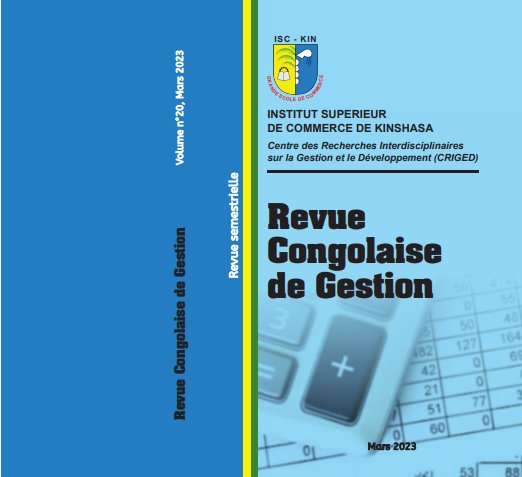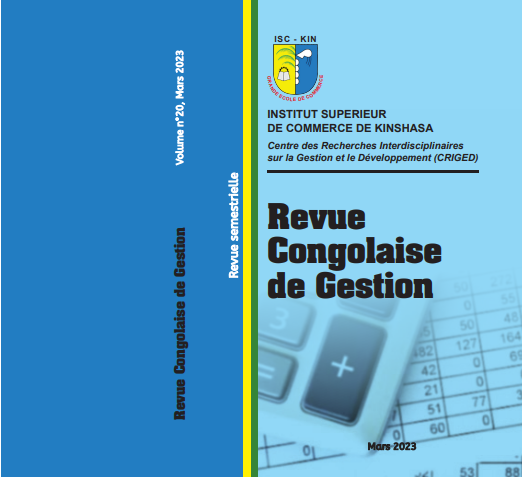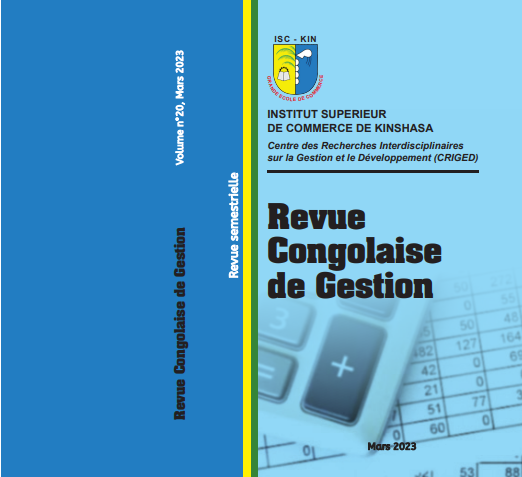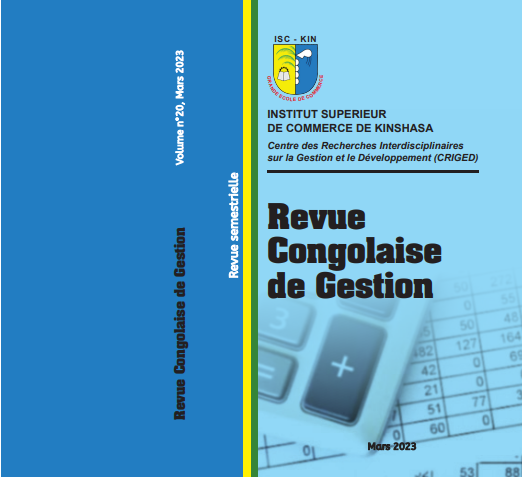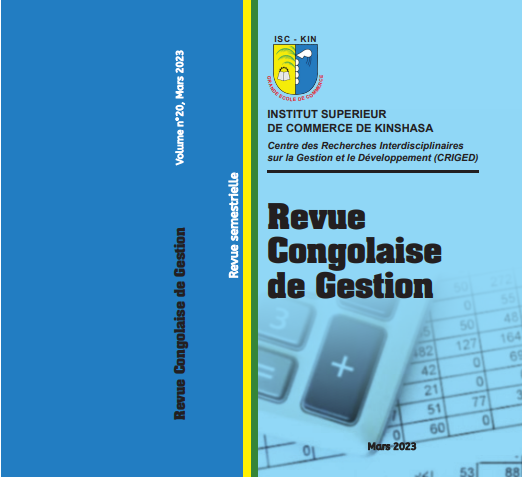Auteur(s)
Rufin Iyeli Maliko
Institut Supérieur de commerce de KinshasaMots-clés
Emotional intelligence, Job performance.Résumé
Background : The influence of emotional intelligence on the job performance of employees is attracting more and more attention from any organization, regardless of its size, nature, dimensions, locations. Based on previous relevant literature in the fields of emotional intelligence and organizational management. This research proposes and examines the internal mechanism, that of the relationship between emotional intelligence and performance in employees of Orange computers. Specifically, this study is to determine how self-management as one of the facets of emotional intelligence influences the performance of employees of Orange computers.
Methods : A 33-item questionnaire, the Likert scale was used to collect data on emotional intelligence and work performance. A total of 276 American employees who work at Orange computers participated in the study.
Results : Statistical package for the social sciences was used to statistically assess the data (SPSS). The results of the present study generated a theoretically significant relationship between emotional intelligence and job performance, which helps to understand the dynamics by which emotional intelligence might influence job performance. The results underscore and reinforce that employee intelligence plays a key role in understanding how employees’ ability to perceive and manage their emotions can directly and indirectly influence their performance at work.
Références
Alawneh, A.R., Sweis, R. J. (2016). The relation between the emotional intelligence level and effectiveness of a project manager : The case of Jordan. International Journal of Information, Business and Management, 8(3),13-27.
Alsheikh, G.A., Awang, Z., Barhem, B. Y.M Alsakarneh, A., Eneizan, B., et al. (2021). Structural equation modelling using AMOS based empirical analysis : Direct and indirect effects of job performance factors among Jordanian Islamic Banks. Webology, 18(2), 955-971. doi :10.14704/WEB/V18I2/WEB18366
Chaiphuak, P. (2014). The initial impact of organization development intervention on relationships between job stress, job satisfaction, and job performance : A case study of St. Gabriel’s College, Bangkok, Thailand. ABAC ODI Journal Vision, Action. Outcome,1(1),
Chandrasekara, W.S. (2019). Relationship among big five personality traits, job performance & job satisfaction : A case of school teachers in SRI LANKA.International Journal of Information, Business and Management, 11(2), 219-232.
Chen, J.C & Silverthorne, C. (2008). The impact of locus of control on job stress, job performance and job satisfaction in Taiwan. Leadership & Organization Development Journal, 29(7),572-582. doi :10.1108/01437730810906326
Chu,L-C., & Lai, C.-C.(2011). A research on the influence of leadership style and job characteristics on job performance among accountants of county and city Government in Taiwan.Public Personnel Management, 40(2), 101-118.
Colfax, R.S., Rivera, J.J, & Perez, K.T. (2010). Applying emotional intelligence(EQ-I) in the workplace : Vital to global business success. Journal of International Business Research, suppl. Special Issue 1, 9, 89-98.
Cote, S., & Christopher, T.H. (2006). Emotional intelligence, cognitive intelligence, and job performance. Administrative Science Quarterly, 51 (2006) : 1-28
EL-Chaarani, H. (2013). Exploring the dimensions of emotional intelligence in the Lebanese family Firms. International Journal of Business and Economic
Development, 1(2), 101-110
Ferdaws, E., Ali, M.Z., & Anis, J. (2016). Does CEO emotional intelligence affect the Performance of the diversifiable companies?. Cogent Economics & Finance, 4(1), 1-17. doi :10.1080/23322039.2016.1230958
Goswami, K., & Mahanta, M. (2021). Exploring the role of emotional labor and job autonomy in the relation between emotional intelligence and job Performance. International Management Review, 17(1), 26-38,87.
Gravetter, F. & Forzano, L-A (2016). Research methods for the behavioral sciences.5th edit. CENGAGE Learnin
Groen, B.C., Wilderom, M.C. & Wouters, C.M. (2017). High job performance through co- developing performance measures with employees. Human Resource Management, 56 (1), 111–132, doi :10.1002/hrm.21762
Guanavathy, J.S. & Aywarya, M.S. (2011). Emotional intelligence and Job satisfaction as correlates of job performance- A study among women employed in the India software industry. Paradigm, XV (1&2), 58-65
Higgs, M. (2004). A study of the relationship between emotional intelligence and performance in UK call centres. Journal of Managerial Psychology, 19(4), 442-454. doi :10.1108/02683940410537972
Ikonne, C.N. (2015). Influence of performance appraisal on job performance of library employees in selected University library and information centers in South-West Nigeria. International Journal of Innovation and Applied Studies, 11(4), 863-871.
Johari, J., & Khulida K.Y. (2016). Job characteristics, work involvement, and job performance of public servants. European Journal of Training and Development, 40(7),554-575. doi :10.1108/EJTD-07-2015-0051
Jorfi, H., Yacco, H.F., & Shah, I.M. (2012). Role of Gender in Emotional Intelligence : Relationship among Emotional Intelligence, Communication Effectiveness and Job Satisfaction. International Journal of Management, 29(4), 590-597.
Kurivilla, J., & Menezes, P. M. (2019). Effect of Emotional Intelligence Training on Emotional Intelligence of graduate Nursing Students. Asian Journal of Nursing Education and Research, 9(3),289-292. DOI :10.5958/2349-
2996.2019.00062.4
Lam, L.T.& Kirby, S. L. (2002). Is emotional intelligence an advantage? An exploration of the impact of emotional and general intelligence on individual performance. The Journal of Social Psychology, 142(1),133-43. doi :10.1080/00224540209603891
Lee, S. Y. & Sang, W. L. (2020). Social media use and job performance in the workplace : The effects of Facebook and KakaoTalk Use on Job Performance in South Korea. Sustainability, 12(10), 4052. doi :10.3390/su12104052
Naqvi, I.H., Iqbal, M., & Shafqat, N.A. (2016). The Relationship between Emotional Intelligence and Performance of Secondary School Teachers. Bulletin of Education and Research, 38(1), n/a.
Nguyen, T.N. (2009). The Relationship between emotional intelligence and instructor Performance in Ho Chi Minh City Univeristy of Foreign Languages and Information Technology (Huflit). Scholar, 1(1).
Okwuduba, E.N. Chinelo, O.E & Nkirum, N.S. (2019). Emotional abilities of emotional intelligence and academic performance : Examining their relationship using Nigeria University Undergraduate Chemistry. Bulgarian Journal of Science and Education Policy, 13(2), 263-285.
Rahmatsyah, P.N., Shimaditya, N., Aurik, G., & Achmad. G. (2018). The Relationship between cultural intelligence, emotional intelligence, and student performance. International Journal of Business, 23(1), 17-25.
Rahmawaty, A., Rokhman, W., Bawono, A., & Irkhami, N. (2021). Emotional intelligence, spiritual intelligence and employee performance : The mediating role of communication competence. International Journal of Business and Society, 22(2), 734-752. doi :10.33736/ijbs.3754.2021
Rahnman, M.S., Ferdausy, S., Rana, K. (2013). Assessing the relationships between the
components of emotional intelligence and job performance : An empirical study. ABAC Journal, 33(1), 1-19
Rangarajan, R & Jayamala, C. (2014). Impact of Emotional Intelligence on Employee Performance-An Epigrammatic Survey. Sumedha Journal of
Management, 3(1).76-81
Rasiah, R., Turner, J.J & Ho, Y.F. (2019). The Impact of Emotional Intelligence on Work Performance : Perceptions and Reflections from Academics in
Malaysian Higher Education Obitat. Contemporary Economics, 13(3), 269-
282 doi : 10.5709/ce.1897-9254.312
Rasool, A., Khatir, G. & NADIR, S. (2018). Diversity and its impact on employee satisfaction and performance. International Journal Of Research In Commerce & Management, 9(7), 12-15.
Sanchez-Gomez, Martin & Bresco, E. (2020). In pursuit of work performance : Testing the
contribution of emotional intelligence and burnout. Int. J. Environ. Res. Public Health,1-13, 17. doi :10.3390/ijerph17155373
Shaikh, S., Mangi, R.A., & Bukhari, N.S.A (2019). Study investigating the empirical relationship of Job insecurity, Job performance and Emotional intelligence : A mediation analysis. Paradigms, 13(2), 177-181. doi :10.24312/19108130223
Shaffer, R.D & Shaffer, A.M. (2005). Emotional intelligence abilities, personality, and workplace performance. Academy of Management Best Conference Paper, 1-6
Suparjo, S.E. (2019). Creativity and transformational leadership on public sector employee performance. Academy of Entrepreneurship Journal, 25(3),1-12.
Sweet, S. A. & Grace-Martin, K. A. (2011). Data analysis with SPSS : a first course in applied statistics. Pearson
Taegoo T.K., Jung-Eun Y. J., Lee, G. & ; Kim,J. (2012). Emotional intelligence and emotional labor acting strategies among frontline hotel employees. International Journal of Contemporary Hospitality Management, 24(7),1029-
1046. doi :10.1108/09596111211258900
Tănăsescu, R.-. & Leon, R.D. (2019). Emotional intelligence, occupational stress, and job
performance in the romanian banking System : A case study approach. Management Dynamics in the Knowledge Economy, 7(3), 323-335. doi :10.25019/MDKE/7.3.03
Vaida, S., & Opre, A. (2014). Emotional intelligence versus emotional competence. Journal of Psychological and Educational Research, 22, (1),26-33.
Vredeveld, A.J. (2018). Emotional intelligence, external emotional connections, and brand
attachment. The Journal of Product and Brand Management, 27(5), 545-556. doi :10.1108/JPBM-10-2017-1613
Wilderom, C.P., Hur, Y., Wiersma, U.J., Denberg, P.V & Lee, J. (2015). From manager’s
emotional intelligence to objective store performance : Through store cohesiveness and sales-directed employee behavior†. Journal of Organizational Behavior, J. Organiz. Behav. 36, 825–844
Whiteoak, J.W & Manning, R.L. (2012). Emotional intelligence and its implications on individual and group performance : a study investigating employee perceptions in the United Arab Emirates. The International Journal of Human Resource Management, 23(8) ,1660–1687
